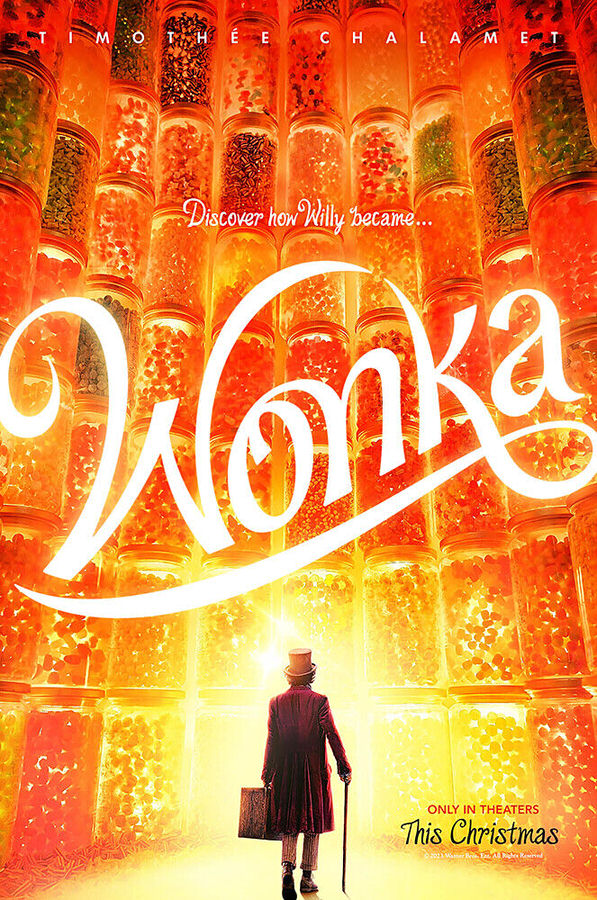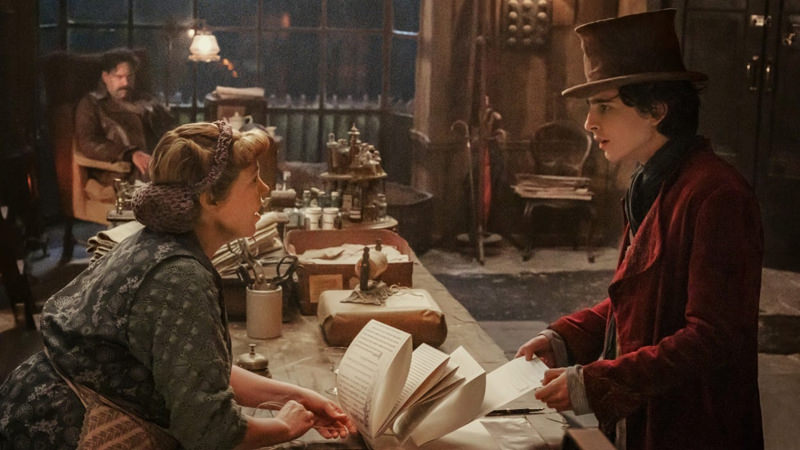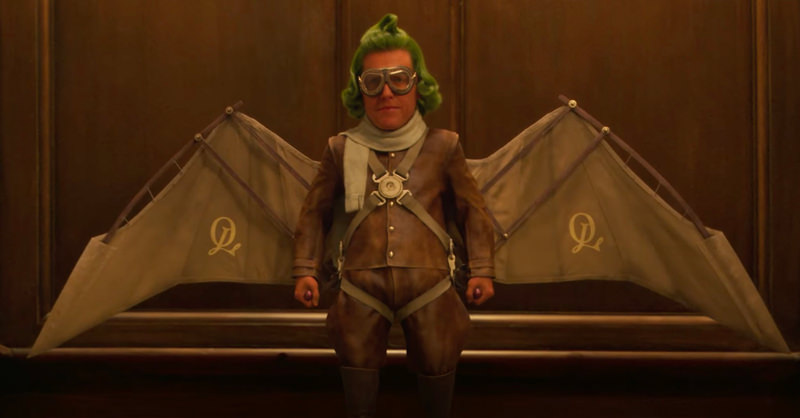Wonka
Directed by Paul King (2023) ***1/2
 The first new book I purchased with my own money (a birthday gift) was Roald Dahl’s Charlie and the Great Glass Elevator, in 1972 (at a B. Dalton mall bookstore, to be exact). The combination of whimsy, satire, sci-fi adventure, snarkiness and fantasy was irresistible (and brought to life wonderfully in illustrations by Joseph Schindelman, whose work is no longer used in newer editions).
The first new book I purchased with my own money (a birthday gift) was Roald Dahl’s Charlie and the Great Glass Elevator, in 1972 (at a B. Dalton mall bookstore, to be exact). The combination of whimsy, satire, sci-fi adventure, snarkiness and fantasy was irresistible (and brought to life wonderfully in illustrations by Joseph Schindelman, whose work is no longer used in newer editions).
Now that Dahl’s works (including Charlie and the Chocolate Factory) are being censored, expurgated and all-around butchered by Penguin Books’ reliance on recommendations from so-called “sensitivity readers”, it’s a good time to revisit his work before it all gets sent down some Orwellian eradication chute.
Wonka, the new film by Paul King (Paddington, Space Force), envisions the early days of the slightly demented, chocolate-making genius, Willy Wonka, and it’s a better film than one would expect. In fact, it’s delightful. Though not based on Dahl-written source material, it captures the essence of his work, which could be hard-edged, even mean-spirited in caricatures of vice and hedonism. The seemingly ubiquitous Timothée Chalamet is a perfect fit for the protagonist role. Unlike Johnny Depp’s version of the character in Tim Burton’s nearly forgettable 2005 reboot, Chalamet mixes charm and sweetness along with the nuttiness in his interpretation. This is a benevolent young Wonka, but also one you can imagine growing into Gene Wilder’s wacky version of the character.
How many times have you watched a film in which a character started singing and you think to yourself, “Oh, no — is this a musical?” You’re not alone. It’s been a trend the past two years (at least) for Hollywood to promote films with trailers that cleverly hide the fact that the films being promoted are musicals (see the original trailers for The Color Purple and Mean Girls for example). Why? Because market research suggests audiences currently don’t like to go see musicals even though, when they do, they frequently enjoy them. Wonka may be the first film since La La Land in which, after seeing it (twice) I wish there’d been more musical numbers, not less. The songs were composed by Neil Hannon, of the Northern Ireland rock group Divine Comedy (an outfit off the radar in America but having recorded a succession of great record albums). With one exception, the new songs are memorable and often quite beautiful. (How many songs does anyone remember from Tim Burton’s Wonka film? I can’t think of one.)
 The plot, about which the less I reveal the better, starts with Wonka, naive, trusting and illiterate, arriving in Europe literally fresh off the boat, hoping to open a chocolate shop in The Galerie Gourmet, a public square of fantastically delicious food-ware stores. He soon finds his ambitions thwarted on two fronts. Penniless after only one day, he takes refuge in a boardinghouse, but the contract he unwittingly signs commits him to slave-like servitude in a basement laundry, alongside five other miserable victims. His dreams of opening a chocolate shop are also contested by the Chocolate Cartel, a consortium of chocolatiers who have conspired with both clergy and the law to monopolize the selling of chocolate. The Cartel, consisting of Felix Fickelgruber (Mathew Baynton) and Gerald Prodnose (Matt Lucas, Nardole on Doctor Who), is headed by Arthur Slugworth (Paterson Joseph). All of the Cartel’s scenes are very funny. Bribed with prodigious amounts of candy are the chief of police (Keegan-Michael Key, of Key & Peele) and Rowan Atkinson (Mr. Bean) as Father Julius.
The plot, about which the less I reveal the better, starts with Wonka, naive, trusting and illiterate, arriving in Europe literally fresh off the boat, hoping to open a chocolate shop in The Galerie Gourmet, a public square of fantastically delicious food-ware stores. He soon finds his ambitions thwarted on two fronts. Penniless after only one day, he takes refuge in a boardinghouse, but the contract he unwittingly signs commits him to slave-like servitude in a basement laundry, alongside five other miserable victims. His dreams of opening a chocolate shop are also contested by the Chocolate Cartel, a consortium of chocolatiers who have conspired with both clergy and the law to monopolize the selling of chocolate. The Cartel, consisting of Felix Fickelgruber (Mathew Baynton) and Gerald Prodnose (Matt Lucas, Nardole on Doctor Who), is headed by Arthur Slugworth (Paterson Joseph). All of the Cartel’s scenes are very funny. Bribed with prodigious amounts of candy are the chief of police (Keegan-Michael Key, of Key & Peele) and Rowan Atkinson (Mr. Bean) as Father Julius.
The film Wonka is bursting with talent. The boardinghouse is run by the unctuous Mrs. Scrubitt (Olivia Colman) and her partner in crime, Bleacher (Tom Davis). The workers they’ve entrapped underground include Abacus Crunch (Jim Carter, of Downton Abbey), Rich Fulcher as Larry Chucklesworth and Wonka’s confidant, Noodle, irresistibly played by the 13-year-old Calah Lane. A whimsical mid-film duet with Wonka and Noodle, “For a Moment”, is as beautifully choreographed, sung and performed a song as one is likely to hear, a real link to the best film musicals of the past. It is divine.
 Hugh Grant, as Oompa Loompa Lofty, is also a hoot. The costume designers smartly used the same Oompa Loompa make-up and designs for this film as the 1971 original. Wonka also uses musical cues and an essential song from the original score by Leslie Bricusse and Anthony Newley, tightening the connection between this prequel and the first cinematic version.
Hugh Grant, as Oompa Loompa Lofty, is also a hoot. The costume designers smartly used the same Oompa Loompa make-up and designs for this film as the 1971 original. Wonka also uses musical cues and an essential song from the original score by Leslie Bricusse and Anthony Newley, tightening the connection between this prequel and the first cinematic version.
Would Roald Dahl have liked Wonka? One can easily imagine him appreciating a Wonka story that involves a band of chocoholic monks, candies tainted with Yeti sweat and villains ready to murder for chocolate profits.
—Michael R. Neno, 2024 February 18